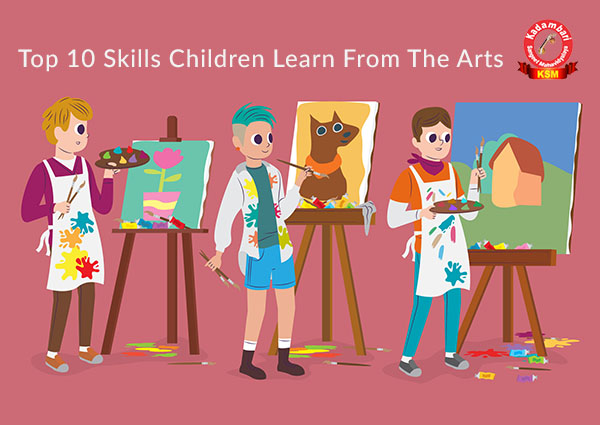Top 10 Skills Children Learn From The Arts
In the following, we’ll be discussing a very important topic that’s “Top 10 skills children learn from the Arts” and will discuss it thoroughly within the article. You don’t notice school reformers talking much regarding how we want to train more lecturers or teachers in the arts, given the current obsession with math, science, technology as well as engineering (STEM), but following is a list of skills that young people learn from studying the arts. They serve as a reminder that the arts — while vital to study for his or her intrinsic value — additionally promote skills seen as vital in academic and life success.
1. Creativity
Being able to think on your feet, approach tasks from totally different perspectives as well as think outside of the box or in a unique way will distinguish or apprehend your child from all others. In an arts program, your kid will be asked to recite a monologue in six different ways, create a painting that represents a memory, or compose a new rhythm to enhance a piece of music. If kids have practice thinking creatively, it’ll come naturally to them now and in their future careers.
2. Confidence
The skills developed through theater, not just trains you how to deliver a message convincingly, but it additionally builds the confidence you need to take command of the stage. Theater training offers youngsters follow stepping out of their temperature and permits them to form mistakes and learn from them in rehearsal. This method offers children the confidence to perform in front of huge audiences.Get in touch with our team for the dance classes in Rohini
3. Problem Solving
Artistic creations that are also creative are born through the problem-solving. What do I need to do to turn this clay into a sculpture? How do I portray a specific emotion through dance? How will my character react in this situation? Without even realizing it children that participate in the arts are consistently being challenged to resolve issues. All this practice problem solving develops kid’s skills in reasoning as well as understanding. This will help develop vital problem-solving skills necessary for success in any career.
4. Perseverance
When a kid picks up a violin for the 1st time, she/he knows that playing Bach right away is not an option or choice; however, when that child practices, learns the skills as well as techniques and does not surrender at any point and works hard, that Bach concerto is that much closer. In a progressively competitive world, where people are being asked to continually develop new skills, perseverance is essential to achieving success.
5. Non-Verbal Communication
Through experiences in theater as well as dance education, kids learn to breakdown the mechanics of body language. They experience different ways of moving as well as how those movements communicate or even portray different emotions. They are then coached in performance skills to confirm they’re portraying their character effectively to the audience.
6. Collaboration
Most arts disciplines or students are quite collaborative in nature. Through the arts, kids practice working together (i.e. working in a group), sharing responsibility as well as compromising with others to accomplish or achieve a common goal. When a baby has a part to play in a music ensemble, or a theater or dance production, they begin to understand that their contribution is necessary for the success of the group. Through these experiences, kids gain confidence and begin to learn that their contributions have value even if they don’t have the largest role.
7. Dedication
When your child gets to practice following through with artistic endeavors, which further result in a finished product or even a performance, they learn to associate or relate dedication with a feeling of accomplishment. They practice developing work habits that are healthy, which are of being on time for rehearsals as well as performances, putting all their effort into the success of the final piece as well as respecting the contributions that others make. In performing arts, the reward for dedication is actually a warm feeling you get because of applause from the audience, that comes rushing over you makes all your efforts worthwhile.
8. Accountability
When your kids practice creating or making something collaboratively (i.e. as a group or pair) they get used to the idea that their actions actually affect other people. They learn that when they aren’t prepared or on-time, that other people suffer. Through the arts, children also learn that it is vital to admit that you made a mistake and thus you should take responsibility for it. Because mistakes are a daily part of the process of learning in the arts, children begin to see that mistakes happen. We acknowledge them, learn from them and thus move on.
9. Focus
The ability to focus is a key or important skill developed through ensemble work. Keeping a balance between listening and contributing involves an excellent deal of concentration and focus. It needs each participant to not only think about their role, however, how their role contributes to the large image of what’s being created. Recent analysis has shown that participation in the arts improves children’s abilities to concentrate and focus on other aspects of their lives.
10. Receiving Constructive Feedback
Receiving feedback that is constructive about a performance or visual art piece is a regular or daily part of any arts instruction. Children learn that feedback is part of learning and it’s not something to be offended by or to be taken personally. It is something helpful. The goal is the improvement of skills and evaluation is incorporated at each step of the process. Each arts discipline has in-built parameters to confirm that critique is a valuable experience and greatly contributes to the success of the final piece.


